Ethical Analysis of Student Data Collection in University Research
VerifiedAdded on 2023/04/22
|7
|1893
|254
Case Study
AI Summary
This case study examines the ethical implications of universities collecting and analyzing student data, focusing on Arizona University's data collection methods via student ID cards and CATCARDs. It applies ethical theories, including Utilitarianism, Deontology, Virtue Theory, and Contract Theory, to analyze the practice of gathering student information for research purposes. The study highlights concerns regarding student privacy and the lack of informed consent. It concludes by recommending greater transparency and measures to protect student data, emphasizing the need for ethical frameworks in data collection practices within educational institutions. Desklib provides resources for students seeking similar case studies and assignment solutions.
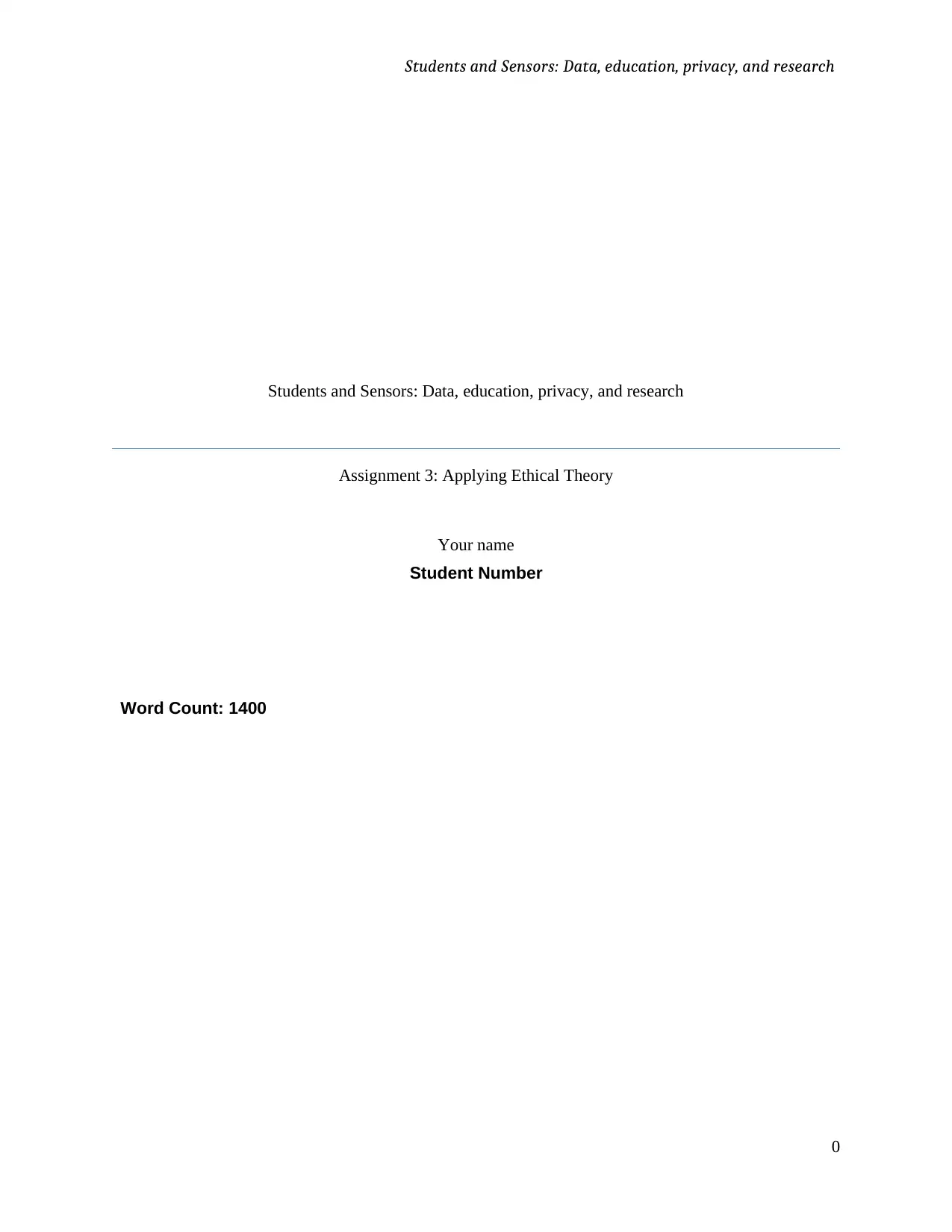
Students and Sensors: Data, education, privacy, and research
Students and Sensors: Data, education, privacy, and research
Assignment 3: Applying Ethical Theory
Your name
Student Number
Word Count: 1400
0
Students and Sensors: Data, education, privacy, and research
Assignment 3: Applying Ethical Theory
Your name
Student Number
Word Count: 1400
0
Paraphrase This Document
Need a fresh take? Get an instant paraphrase of this document with our AI Paraphraser
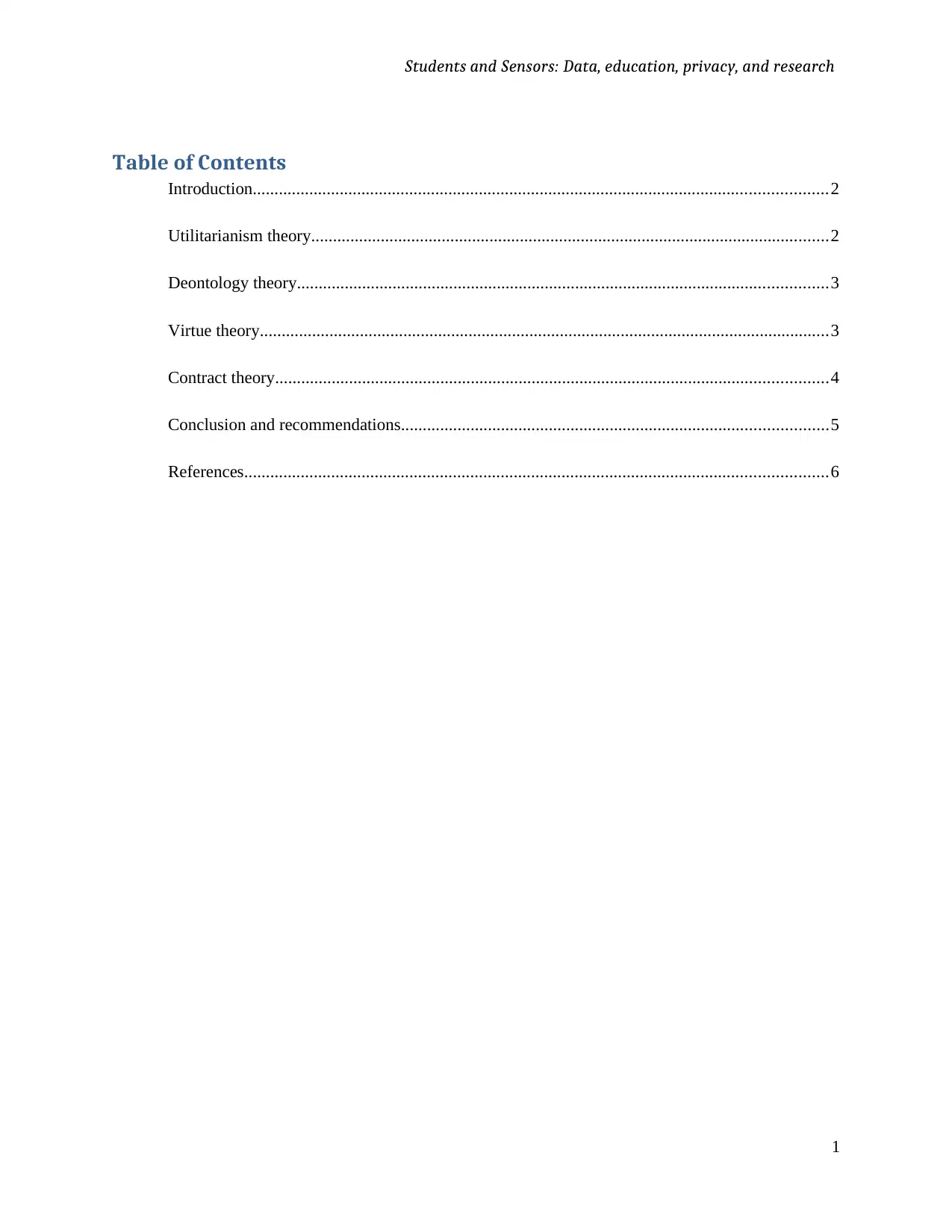
Students and Sensors: Data, education, privacy, and research
Table of Contents
Introduction....................................................................................................................................2
Utilitarianism theory.......................................................................................................................2
Deontology theory..........................................................................................................................3
Virtue theory...................................................................................................................................3
Contract theory...............................................................................................................................4
Conclusion and recommendations..................................................................................................5
References......................................................................................................................................6
1
Table of Contents
Introduction....................................................................................................................................2
Utilitarianism theory.......................................................................................................................2
Deontology theory..........................................................................................................................3
Virtue theory...................................................................................................................................3
Contract theory...............................................................................................................................4
Conclusion and recommendations..................................................................................................5
References......................................................................................................................................6
1
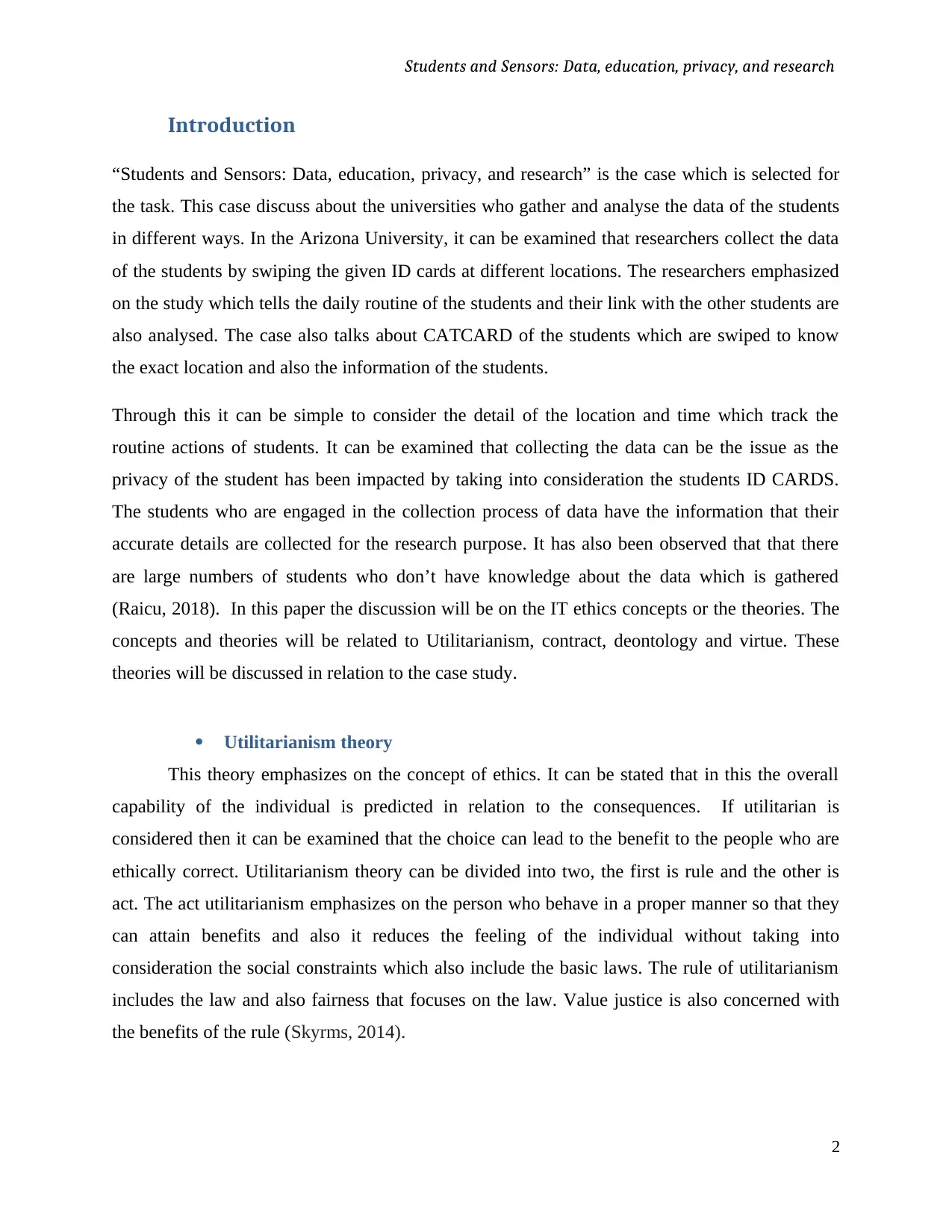
Students and Sensors: Data, education, privacy, and research
Introduction
“Students and Sensors: Data, education, privacy, and research” is the case which is selected for
the task. This case discuss about the universities who gather and analyse the data of the students
in different ways. In the Arizona University, it can be examined that researchers collect the data
of the students by swiping the given ID cards at different locations. The researchers emphasized
on the study which tells the daily routine of the students and their link with the other students are
also analysed. The case also talks about CATCARD of the students which are swiped to know
the exact location and also the information of the students.
Through this it can be simple to consider the detail of the location and time which track the
routine actions of students. It can be examined that collecting the data can be the issue as the
privacy of the student has been impacted by taking into consideration the students ID CARDS.
The students who are engaged in the collection process of data have the information that their
accurate details are collected for the research purpose. It has also been observed that that there
are large numbers of students who don’t have knowledge about the data which is gathered
(Raicu, 2018). In this paper the discussion will be on the IT ethics concepts or the theories. The
concepts and theories will be related to Utilitarianism, contract, deontology and virtue. These
theories will be discussed in relation to the case study.
Utilitarianism theory
This theory emphasizes on the concept of ethics. It can be stated that in this the overall
capability of the individual is predicted in relation to the consequences. If utilitarian is
considered then it can be examined that the choice can lead to the benefit to the people who are
ethically correct. Utilitarianism theory can be divided into two, the first is rule and the other is
act. The act utilitarianism emphasizes on the person who behave in a proper manner so that they
can attain benefits and also it reduces the feeling of the individual without taking into
consideration the social constraints which also include the basic laws. The rule of utilitarianism
includes the law and also fairness that focuses on the law. Value justice is also concerned with
the benefits of the rule (Skyrms, 2014).
2
Introduction
“Students and Sensors: Data, education, privacy, and research” is the case which is selected for
the task. This case discuss about the universities who gather and analyse the data of the students
in different ways. In the Arizona University, it can be examined that researchers collect the data
of the students by swiping the given ID cards at different locations. The researchers emphasized
on the study which tells the daily routine of the students and their link with the other students are
also analysed. The case also talks about CATCARD of the students which are swiped to know
the exact location and also the information of the students.
Through this it can be simple to consider the detail of the location and time which track the
routine actions of students. It can be examined that collecting the data can be the issue as the
privacy of the student has been impacted by taking into consideration the students ID CARDS.
The students who are engaged in the collection process of data have the information that their
accurate details are collected for the research purpose. It has also been observed that that there
are large numbers of students who don’t have knowledge about the data which is gathered
(Raicu, 2018). In this paper the discussion will be on the IT ethics concepts or the theories. The
concepts and theories will be related to Utilitarianism, contract, deontology and virtue. These
theories will be discussed in relation to the case study.
Utilitarianism theory
This theory emphasizes on the concept of ethics. It can be stated that in this the overall
capability of the individual is predicted in relation to the consequences. If utilitarian is
considered then it can be examined that the choice can lead to the benefit to the people who are
ethically correct. Utilitarianism theory can be divided into two, the first is rule and the other is
act. The act utilitarianism emphasizes on the person who behave in a proper manner so that they
can attain benefits and also it reduces the feeling of the individual without taking into
consideration the social constraints which also include the basic laws. The rule of utilitarianism
includes the law and also fairness that focuses on the law. Value justice is also concerned with
the benefits of the rule (Skyrms, 2014).
2
⊘ This is a preview!⊘
Do you want full access?
Subscribe today to unlock all pages.

Trusted by 1+ million students worldwide
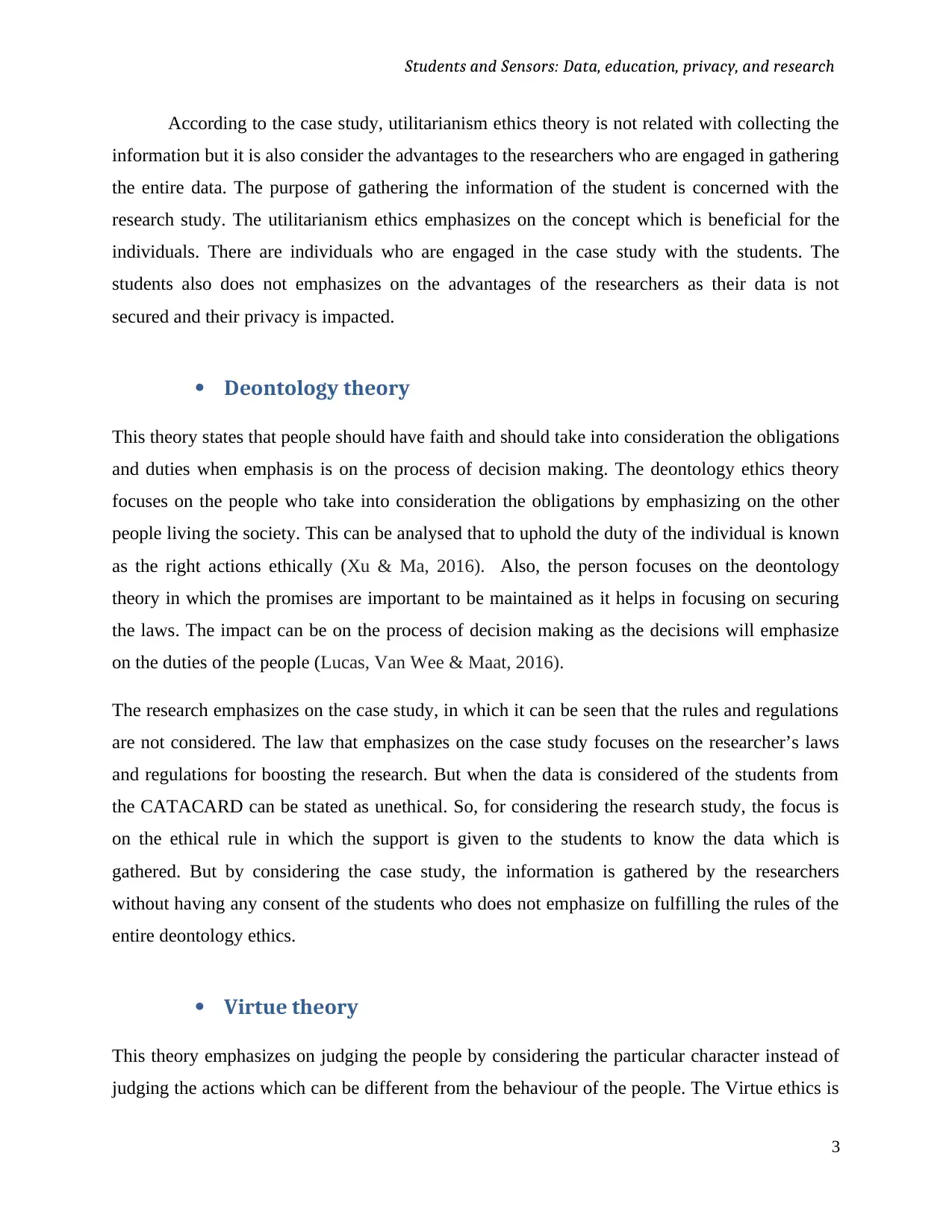
Students and Sensors: Data, education, privacy, and research
According to the case study, utilitarianism ethics theory is not related with collecting the
information but it is also consider the advantages to the researchers who are engaged in gathering
the entire data. The purpose of gathering the information of the student is concerned with the
research study. The utilitarianism ethics emphasizes on the concept which is beneficial for the
individuals. There are individuals who are engaged in the case study with the students. The
students also does not emphasizes on the advantages of the researchers as their data is not
secured and their privacy is impacted.
Deontology theory
This theory states that people should have faith and should take into consideration the obligations
and duties when emphasis is on the process of decision making. The deontology ethics theory
focuses on the people who take into consideration the obligations by emphasizing on the other
people living the society. This can be analysed that to uphold the duty of the individual is known
as the right actions ethically (Xu & Ma, 2016). Also, the person focuses on the deontology
theory in which the promises are important to be maintained as it helps in focusing on securing
the laws. The impact can be on the process of decision making as the decisions will emphasize
on the duties of the people (Lucas, Van Wee & Maat, 2016).
The research emphasizes on the case study, in which it can be seen that the rules and regulations
are not considered. The law that emphasizes on the case study focuses on the researcher’s laws
and regulations for boosting the research. But when the data is considered of the students from
the CATACARD can be stated as unethical. So, for considering the research study, the focus is
on the ethical rule in which the support is given to the students to know the data which is
gathered. But by considering the case study, the information is gathered by the researchers
without having any consent of the students who does not emphasize on fulfilling the rules of the
entire deontology ethics.
Virtue theory
This theory emphasizes on judging the people by considering the particular character instead of
judging the actions which can be different from the behaviour of the people. The Virtue ethics is
3
According to the case study, utilitarianism ethics theory is not related with collecting the
information but it is also consider the advantages to the researchers who are engaged in gathering
the entire data. The purpose of gathering the information of the student is concerned with the
research study. The utilitarianism ethics emphasizes on the concept which is beneficial for the
individuals. There are individuals who are engaged in the case study with the students. The
students also does not emphasizes on the advantages of the researchers as their data is not
secured and their privacy is impacted.
Deontology theory
This theory states that people should have faith and should take into consideration the obligations
and duties when emphasis is on the process of decision making. The deontology ethics theory
focuses on the people who take into consideration the obligations by emphasizing on the other
people living the society. This can be analysed that to uphold the duty of the individual is known
as the right actions ethically (Xu & Ma, 2016). Also, the person focuses on the deontology
theory in which the promises are important to be maintained as it helps in focusing on securing
the laws. The impact can be on the process of decision making as the decisions will emphasize
on the duties of the people (Lucas, Van Wee & Maat, 2016).
The research emphasizes on the case study, in which it can be seen that the rules and regulations
are not considered. The law that emphasizes on the case study focuses on the researcher’s laws
and regulations for boosting the research. But when the data is considered of the students from
the CATACARD can be stated as unethical. So, for considering the research study, the focus is
on the ethical rule in which the support is given to the students to know the data which is
gathered. But by considering the case study, the information is gathered by the researchers
without having any consent of the students who does not emphasize on fulfilling the rules of the
entire deontology ethics.
Virtue theory
This theory emphasizes on judging the people by considering the particular character instead of
judging the actions which can be different from the behaviour of the people. The Virtue ethics is
3
Paraphrase This Document
Need a fresh take? Get an instant paraphrase of this document with our AI Paraphraser
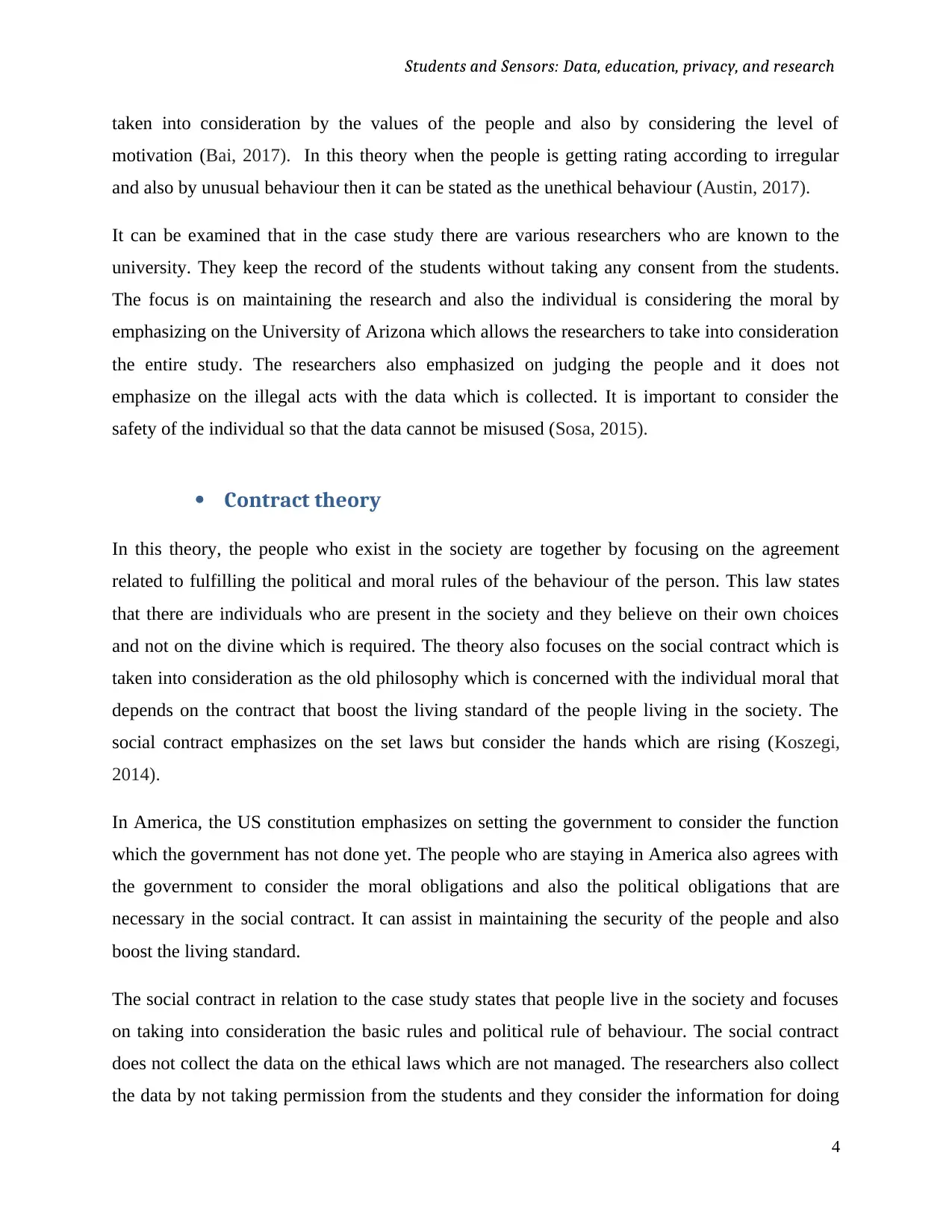
Students and Sensors: Data, education, privacy, and research
taken into consideration by the values of the people and also by considering the level of
motivation (Bai, 2017). In this theory when the people is getting rating according to irregular
and also by unusual behaviour then it can be stated as the unethical behaviour (Austin, 2017).
It can be examined that in the case study there are various researchers who are known to the
university. They keep the record of the students without taking any consent from the students.
The focus is on maintaining the research and also the individual is considering the moral by
emphasizing on the University of Arizona which allows the researchers to take into consideration
the entire study. The researchers also emphasized on judging the people and it does not
emphasize on the illegal acts with the data which is collected. It is important to consider the
safety of the individual so that the data cannot be misused (Sosa, 2015).
Contract theory
In this theory, the people who exist in the society are together by focusing on the agreement
related to fulfilling the political and moral rules of the behaviour of the person. This law states
that there are individuals who are present in the society and they believe on their own choices
and not on the divine which is required. The theory also focuses on the social contract which is
taken into consideration as the old philosophy which is concerned with the individual moral that
depends on the contract that boost the living standard of the people living in the society. The
social contract emphasizes on the set laws but consider the hands which are rising (Koszegi,
2014).
In America, the US constitution emphasizes on setting the government to consider the function
which the government has not done yet. The people who are staying in America also agrees with
the government to consider the moral obligations and also the political obligations that are
necessary in the social contract. It can assist in maintaining the security of the people and also
boost the living standard.
The social contract in relation to the case study states that people live in the society and focuses
on taking into consideration the basic rules and political rule of behaviour. The social contract
does not collect the data on the ethical laws which are not managed. The researchers also collect
the data by not taking permission from the students and they consider the information for doing
4
taken into consideration by the values of the people and also by considering the level of
motivation (Bai, 2017). In this theory when the people is getting rating according to irregular
and also by unusual behaviour then it can be stated as the unethical behaviour (Austin, 2017).
It can be examined that in the case study there are various researchers who are known to the
university. They keep the record of the students without taking any consent from the students.
The focus is on maintaining the research and also the individual is considering the moral by
emphasizing on the University of Arizona which allows the researchers to take into consideration
the entire study. The researchers also emphasized on judging the people and it does not
emphasize on the illegal acts with the data which is collected. It is important to consider the
safety of the individual so that the data cannot be misused (Sosa, 2015).
Contract theory
In this theory, the people who exist in the society are together by focusing on the agreement
related to fulfilling the political and moral rules of the behaviour of the person. This law states
that there are individuals who are present in the society and they believe on their own choices
and not on the divine which is required. The theory also focuses on the social contract which is
taken into consideration as the old philosophy which is concerned with the individual moral that
depends on the contract that boost the living standard of the people living in the society. The
social contract emphasizes on the set laws but consider the hands which are rising (Koszegi,
2014).
In America, the US constitution emphasizes on setting the government to consider the function
which the government has not done yet. The people who are staying in America also agrees with
the government to consider the moral obligations and also the political obligations that are
necessary in the social contract. It can assist in maintaining the security of the people and also
boost the living standard.
The social contract in relation to the case study states that people live in the society and focuses
on taking into consideration the basic rules and political rule of behaviour. The social contract
does not collect the data on the ethical laws which are not managed. The researchers also collect
the data by not taking permission from the students and they consider the information for doing
4
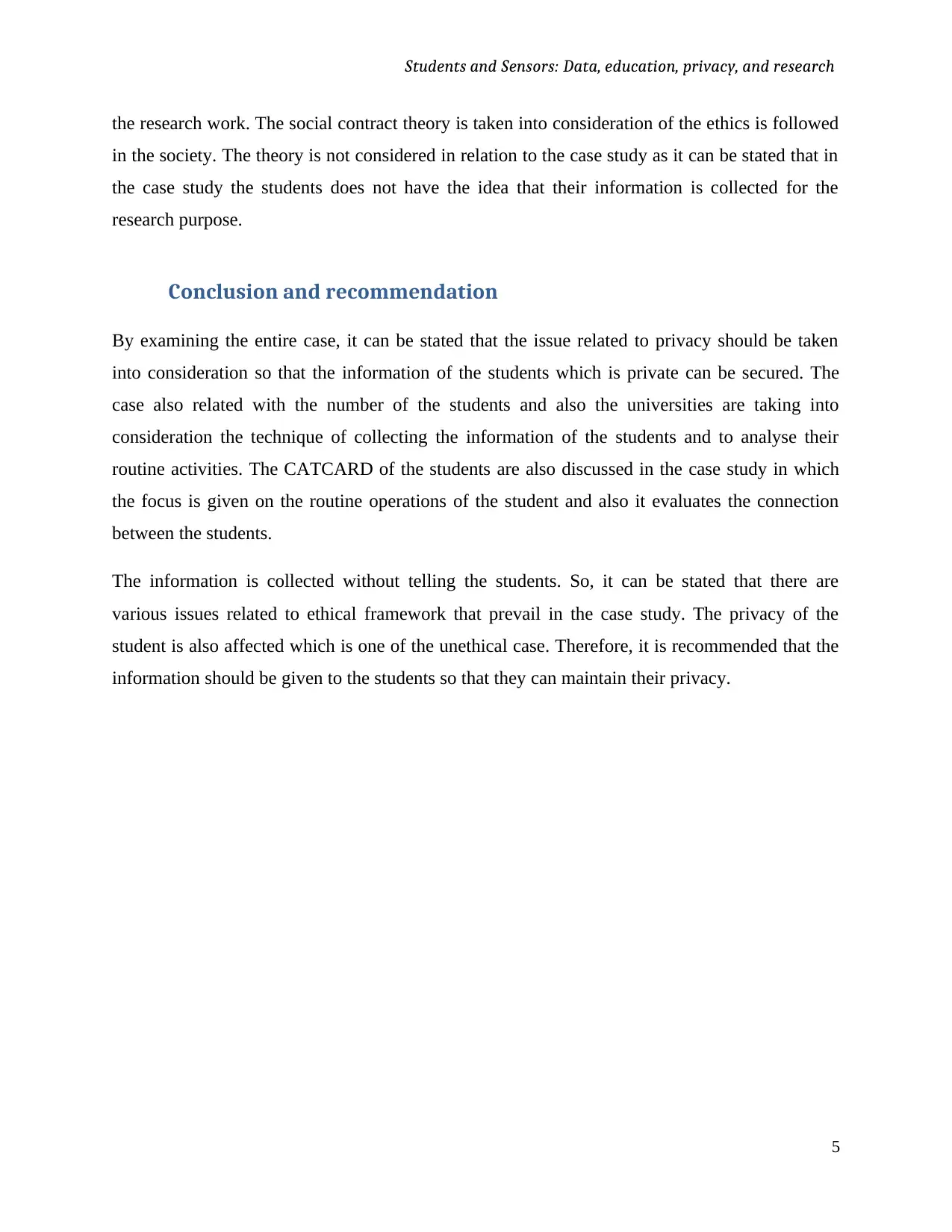
Students and Sensors: Data, education, privacy, and research
the research work. The social contract theory is taken into consideration of the ethics is followed
in the society. The theory is not considered in relation to the case study as it can be stated that in
the case study the students does not have the idea that their information is collected for the
research purpose.
Conclusion and recommendation
By examining the entire case, it can be stated that the issue related to privacy should be taken
into consideration so that the information of the students which is private can be secured. The
case also related with the number of the students and also the universities are taking into
consideration the technique of collecting the information of the students and to analyse their
routine activities. The CATCARD of the students are also discussed in the case study in which
the focus is given on the routine operations of the student and also it evaluates the connection
between the students.
The information is collected without telling the students. So, it can be stated that there are
various issues related to ethical framework that prevail in the case study. The privacy of the
student is also affected which is one of the unethical case. Therefore, it is recommended that the
information should be given to the students so that they can maintain their privacy.
5
the research work. The social contract theory is taken into consideration of the ethics is followed
in the society. The theory is not considered in relation to the case study as it can be stated that in
the case study the students does not have the idea that their information is collected for the
research purpose.
Conclusion and recommendation
By examining the entire case, it can be stated that the issue related to privacy should be taken
into consideration so that the information of the students which is private can be secured. The
case also related with the number of the students and also the universities are taking into
consideration the technique of collecting the information of the students and to analyse their
routine activities. The CATCARD of the students are also discussed in the case study in which
the focus is given on the routine operations of the student and also it evaluates the connection
between the students.
The information is collected without telling the students. So, it can be stated that there are
various issues related to ethical framework that prevail in the case study. The privacy of the
student is also affected which is one of the unethical case. Therefore, it is recommended that the
information should be given to the students so that they can maintain their privacy.
5
⊘ This is a preview!⊘
Do you want full access?
Subscribe today to unlock all pages.

Trusted by 1+ million students worldwide
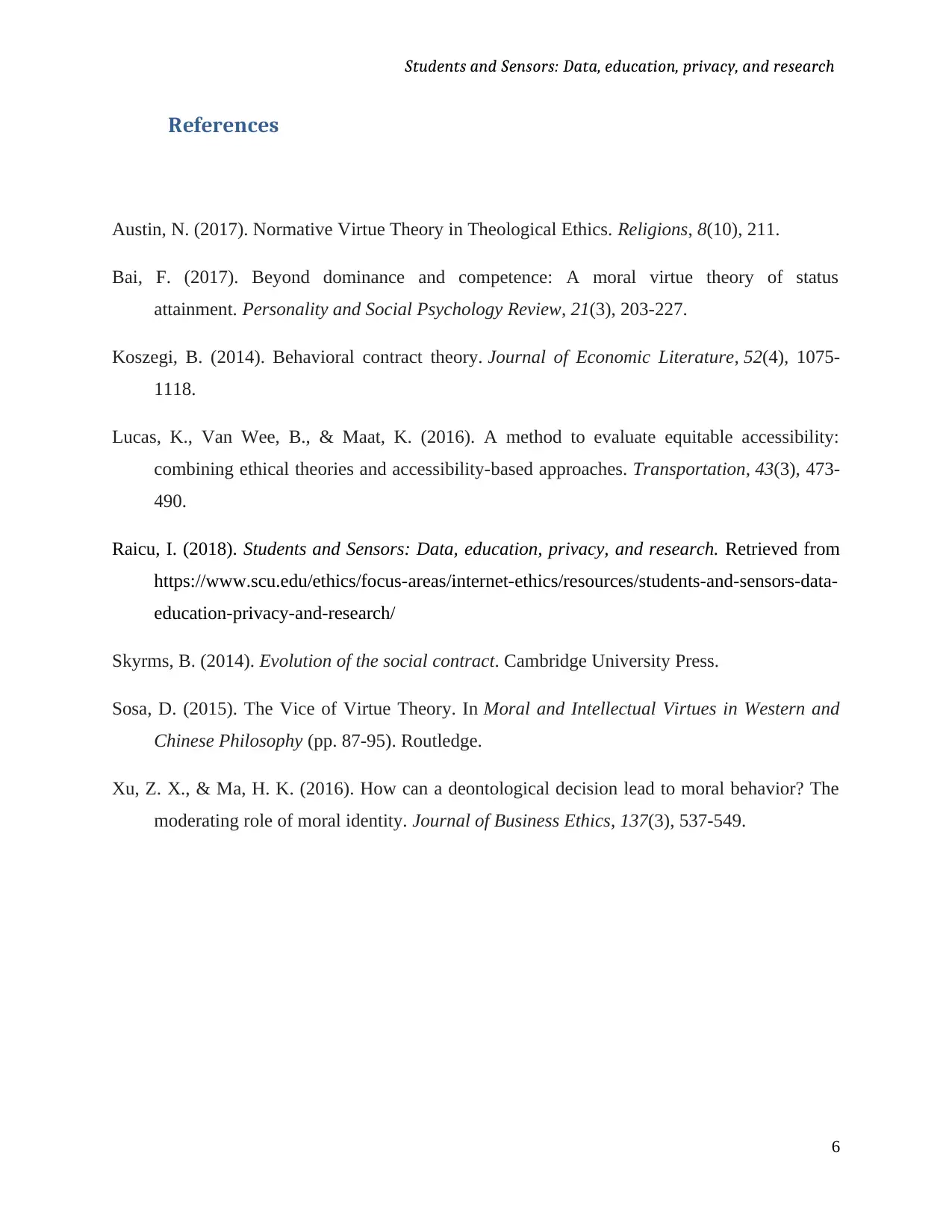
Students and Sensors: Data, education, privacy, and research
References
Austin, N. (2017). Normative Virtue Theory in Theological Ethics. Religions, 8(10), 211.
Bai, F. (2017). Beyond dominance and competence: A moral virtue theory of status
attainment. Personality and Social Psychology Review, 21(3), 203-227.
Koszegi, B. (2014). Behavioral contract theory. Journal of Economic Literature, 52(4), 1075-
1118.
Lucas, K., Van Wee, B., & Maat, K. (2016). A method to evaluate equitable accessibility:
combining ethical theories and accessibility-based approaches. Transportation, 43(3), 473-
490.
Raicu, I. (2018). Students and Sensors: Data, education, privacy, and research. Retrieved from
https://www.scu.edu/ethics/focus-areas/internet-ethics/resources/students-and-sensors-data-
education-privacy-and-research/
Skyrms, B. (2014). Evolution of the social contract. Cambridge University Press.
Sosa, D. (2015). The Vice of Virtue Theory. In Moral and Intellectual Virtues in Western and
Chinese Philosophy (pp. 87-95). Routledge.
Xu, Z. X., & Ma, H. K. (2016). How can a deontological decision lead to moral behavior? The
moderating role of moral identity. Journal of Business Ethics, 137(3), 537-549.
6
References
Austin, N. (2017). Normative Virtue Theory in Theological Ethics. Religions, 8(10), 211.
Bai, F. (2017). Beyond dominance and competence: A moral virtue theory of status
attainment. Personality and Social Psychology Review, 21(3), 203-227.
Koszegi, B. (2014). Behavioral contract theory. Journal of Economic Literature, 52(4), 1075-
1118.
Lucas, K., Van Wee, B., & Maat, K. (2016). A method to evaluate equitable accessibility:
combining ethical theories and accessibility-based approaches. Transportation, 43(3), 473-
490.
Raicu, I. (2018). Students and Sensors: Data, education, privacy, and research. Retrieved from
https://www.scu.edu/ethics/focus-areas/internet-ethics/resources/students-and-sensors-data-
education-privacy-and-research/
Skyrms, B. (2014). Evolution of the social contract. Cambridge University Press.
Sosa, D. (2015). The Vice of Virtue Theory. In Moral and Intellectual Virtues in Western and
Chinese Philosophy (pp. 87-95). Routledge.
Xu, Z. X., & Ma, H. K. (2016). How can a deontological decision lead to moral behavior? The
moderating role of moral identity. Journal of Business Ethics, 137(3), 537-549.
6
1 out of 7
Related Documents
Your All-in-One AI-Powered Toolkit for Academic Success.
+13062052269
info@desklib.com
Available 24*7 on WhatsApp / Email
![[object Object]](/_next/static/media/star-bottom.7253800d.svg)
Unlock your academic potential
Copyright © 2020–2026 A2Z Services. All Rights Reserved. Developed and managed by ZUCOL.


